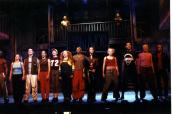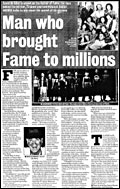| The Show | Creative Team | Productions | Sights/Sounds | Reviews | Foundation | Extras | FFF.Org |
Home > Past Buzz > Man Who Brought Fame to Millions
...........................................................................................................
Manchester News
March, 25, 2003
For a generation of British children growing up in the grey eighties, fame was the spur.
We might be stuck at home, eating still-novel microwave meals on our knees but, on the television in front of us a bunch of brash New Yorkers danced and played piano and told us they were going to "live forever" and, more bizarrely, "learn how to fly."
Every week we would tune into the exploits of Coco, Leroy, Bruno and the rest - an obsession, which helped turned Fame first into one of the most popular TV series of all time and a worldwide cultural phenomenon.
David De Silva, the man behind the film, the TV show and, now, the musical, laughs. "I don't know why it was so successful," he says. "I think perhaps it's because people would watch the film or the TV show and think `I could do that' - if these kids can do it, so can I."
In that sense, Fame was almost a fictional precursor to today's reality TV shows. Deprived of the chance to queue for hours and be ridiculed on Pop Idol, Fame's fans instead watched a bunch of up-and-coming actors depict the struggles of trying to make it big in New York.
Given that, it is no surprise, to learn that De Silva based the show on a real-life school - The La Guardia School of Performing Arts in New York – and following the success of the film, the number of applications to the school rose.
"Oh definitely," says the genial De Silva, who still lives in New York. "The applications went through the roof - suddenly everyone wanted to go to the "Fame" school."
But how did De Silva come up with the idea for Fame? A qualified teacher working in theatre, he became interested in the possibility of a "youth" film and hit on La Guardia - then known as the New York High School of Performing Arts - as the perfect starting point.
"We did a lot of research," he admits. "We hung around for weeks, talking to teachers and pupils and just studying how things worked. One of the things that most interested me about La Guardia was that it was a magnet school - what that means is that anyone could attend. Whereas network restrictions ensured that on the small screen everything was solved with a good singalong or by dancing manically in the ever-dazzling Fame cafeteria, the film dealt with drugs, sex for money and homosexuality and was notably bleak in parts.
"Well, obviously you can get away with a lot more in film." De Silva admits. "Actually, we've gone back a bit to the film style with the musical because, again, you can be quite hard hitting on stage. So, we have a character in the musical who talks about how she wants to lve forever at the beginning, but ends up a junkie by the end. It is a largely feel good musical but I don't think you should ignore the fact that, for every kid who makes it, there's one who just slips away."
"You weren't prevented from going because of your background, whether you were rich or poor and I thought that that could provide an interesting dynamic for a film because you had rich kids and poor kids working side by side and becoming friends. That was very interesting to me."
Nor does the musical follow the exact plot of either the film or the TV show. Instead, De Silva explains, it starts somewhat after the events of the film - in that period when applications flooded into La Guardia and everyone thought they, too, could be a star.
"I thought it was more interesting to look at what happens when the kids applying are doing so because they've seen a film or a TV show," De Silva says.
It's a nice, almost post-modern, line and the references back to the real-life school don't stop there. "One of the main stories is about a dancer who's illiterate and the argument which developes between the English teacher and the dance teacher over him," De Silva explains.
"Well, that was based on a real-life incident which divided the school."
"What was very interesting was that since the success of Fame things had changed - before that English and Maths were given equal importance, but after the show the drama and music and dance teachers were saying "We are what this school is all about, we are what has made it a success" and that created a great deal of tension."
Talking to De Silva it's easy to sense his love of the show he first created over 20 years ago is still as great as ever. The musical differs from other shows in that choreographers, directors and the stars are allowed to put their own imprint on it and change things if they so wish.
"You know this show is a success all over the world and yet it's never the same show in any city," he says. "But that's its legacy, that's what I love about it. I don't think musicals should be bowed down by convention and I would never say this is my show and it should stay like this.
"The important thing about Fame is that every one involved enjoys themselves and has fun and if they become a star because of it, well, isn't that what the show's all about?"
Fame is on at the Opera House, Manchester until Saturday, March 29. Performances at 7.30pm Monday to Saturday, 5.30pm Friday and 2.30pm matinee on Saturday. Tickets priced £11-£24 available from 0161 242 2524


